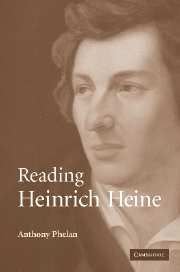Book contents
- Frontmatter
- Contents
- Acknowledgements
- Introduction
- PART I THE BIOGRAPHICAL IMPERATIVE
- PART II THE REAL HEINE
- 6 How to become a symbolist: Heine and the anthologies of Stefan George and Rudolf Borchardt
- 7 The real Heine: Atta Troll and allegory
- 8 Ventriloquism in Ludwig Börne. Eine Denkschrift
- PART III PARISIAN WRITING
- PART IV EPILOGUE
- Notes
- Bibliography
- Index
6 - How to become a symbolist: Heine and the anthologies of Stefan George and Rudolf Borchardt
Published online by Cambridge University Press: 22 September 2009
- Frontmatter
- Contents
- Acknowledgements
- Introduction
- PART I THE BIOGRAPHICAL IMPERATIVE
- PART II THE REAL HEINE
- 6 How to become a symbolist: Heine and the anthologies of Stefan George and Rudolf Borchardt
- 7 The real Heine: Atta Troll and allegory
- 8 Ventriloquism in Ludwig Börne. Eine Denkschrift
- PART III PARISIAN WRITING
- PART IV EPILOGUE
- Notes
- Bibliography
- Index
Summary
reading backward … is always the way reading takes place: through our cultural formation.
Heine's writing in Buch der Lieder and in the pictures of travel exploits the derivative and literary character of apparently biographical reference, and challenges his readers to attend to a deferred sense in an age when more naive communities of understanding have begun to disappear. By the end of the nineteenth century, however, he had achieved a broad popularity. Together with the iconoclasm of his poetics, this presented a major problem for the emerging modernist aesthetic. The form of his reception by twentieth-century authors in the symbolist tradition also makes it possible to identify those elements of his work which anticipate their own account of modernity. In influential anthologies, Stefan George and Rudolf Borchardt document the awkwardness with which Heine was read. Their critical and editorial handling of his poetry suggests ways in which his writing pointed towards aspects of symbolist poetics and also provides a context in which to examine Atta Troll as a poem that deals with the shift to modern sensibilities, as ‘the last free woodland song of Romanticism’, obsessed with modern styles.
STEFAN GEORGE'S HEINE
Stefan George and Karl Wolfskehl first published their ground-breaking anthology Das Jahrhundert Goethes (Goethe's Century) in 1902. George's remarks in the preface to the first edition were widely influential, and clearly had a significant impact on Karl Kraus.
- Type
- Chapter
- Information
- Reading Heinrich Heine , pp. 113 - 128Publisher: Cambridge University PressPrint publication year: 2007



